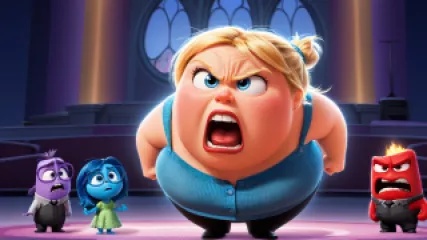7 Anger Management Lessons from Disney's 'Inside Out' for Children
7 Anger Management Lessons from Disney's 'Inside Out' for Children
Parenting can be a challenging journey, especially when it comes to navigating the complex emotions of children. One of the most common and often overwhelming experiences for both parents and kids is dealing with anger. As parents, we strive to help our little ones understand and express their feelings in healthy ways, but sometimes, it can be a daunting task. Fortunately, we can turn to unexpected sources for guidance – like the beloved Pixar film, "Inside Out."
In this animated masterpiece, we're taken on a captivating journey through the mind of an 11-year-old girl, Riley, and her emotions – Joy, Sadness, Fear, Disgust, and Anger. The way these emotions are portrayed and the lessons they impart can provide invaluable insights into helping our own children manage their anger in constructive ways.
In this article, we'll explore 7 powerful anger management lessons we can learn from "Inside Out" and how to apply them to supporting our children's emotional well-being. From understanding the purpose of anger to developing healthy coping strategies, this article aims to equip you with practical tools to navigate the challenges of childhood anger with empathy, patience, and a touch of Disney magic.
1. Anger Serves a Purpose
One of the key lessons from "Inside Out" is that each emotion, including anger, has a vital role to play in our lives. Anger, in particular, is a powerful emotion that serves to protect us, stand up for our rights, and motivate us to take action. In the film, Anger is depicted as a short, red, fiery character who is responsible for ensuring Riley's needs are met and her boundaries are respected.
As parents, it's important to help our children understand that anger is not inherently "bad" or something to be suppressed. Anger is a natural and necessary emotion that can be channeled in constructive ways. By acknowledging the purpose of anger and teaching our kids to express it appropriately, we can help them develop the emotional intelligence to navigate challenging situations with confidence and resilience.
2. Anger Needs a Healthy Outlet
In "Inside Out," we see Anger attempting to take control of Riley's mind, leading to impulsive and destructive behaviors. This serves as a powerful reminder that anger, when left unchecked, can quickly spiral out of control and cause harm. As parents, it's our responsibility to provide our children with healthy outlets for their anger, rather than allowing it to become a destructive force.
Some of the ways we can help our kids express anger in a constructive manner include:
- Physical activity: Encourage children to engage in physical exercises, such as punching a pillow, jumping, or running, to release pent-up energy and tension.
- Creative expression: Offer opportunities for children to express their anger through art, writing, or music, allowing them to channel their emotions in a productive way.
- Talking it out: Create a safe space for children to verbalize their feelings, listen to their perspective, and work together to find solutions.
- Mindfulness techniques: Teach children simple breathing exercises, visualization, or other mindfulness practices to help them calm down and regain control of their emotions.
By providing these healthy outlets, we empower our children to manage their anger in a way that is both constructive and empowering.
3. Anger Can Overshadow Other Emotions
In "Inside Out," we witness how Anger can often overshadow the other emotions, taking center stage and disrupting the delicate balance within Riley's mind. This is a common challenge faced by both children and adults when dealing with anger. When anger becomes the dominant emotion, it can cloud our judgment, inhibit our ability to empathize, and prevent us from accessing the nuanced emotional experiences that make us human.
As parents, it's crucial to help our children recognize that anger is just one piece of the emotional puzzle. We need to guide them in acknowledging and validating the full range of their emotions, from joy and sadness to fear and disgust. By fostering this emotional awareness, we can prevent anger from becoming the sole driving force behind their behaviors and decisions.
4. Anger Can Disrupt Memories and Relationships
One of the most poignant moments in "Inside Out" is when Anger's actions lead to the destruction of Riley's core memories, causing significant disruption to her personality and relationships. This powerful metaphor serves as a reminder that uncontrolled anger can have far-reaching consequences, not just in the moment but also on our long-term well-being and the quality of our interpersonal connections.
As parents, it's essential that we help our children understand the impact that their anger can have on their relationships with family, friends, and loved ones. By teaching them strategies for managing anger, we can prevent it from becoming a destructive force that damages the precious bonds and memories they've built. This includes modeling healthy conflict resolution, encouraging empathy and perspective-taking, and fostering emotional resilience.
5. Anger Can Distort Reality
In "Inside Out," we witness how Anger can distort Riley's perception of reality, leading her to make impulsive decisions that ultimately harm her relationships and well-being. This is a common challenge faced by children and adults alike, as anger can cloud our judgment and prevent us from seeing the full picture.
As parents, it's crucial that we help our children develop the ability to step back and gain a more balanced perspective when they're feeling angry. This might involve teaching them to pause, take a deep breath, and consider the situation from multiple angles before reacting. By cultivating this emotional awareness and self-regulation, we empower our children to make more thoughtful and constructive choices, even in the midst of intense emotions.
6. Anger Needs to be Validated, Not Suppressed
One of the powerful lessons from "Inside Out" is the importance of validating emotions, even the seemingly "negative" ones like anger. In the film, we see how Sadness, often overlooked and dismissed, plays a vital role in Riley's emotional development and resilience. Similarly, Anger, when acknowledged and given a voice, can serve as a catalyst for positive change.
As parents, it's essential that we create a safe and non-judgmental space for our children to express their anger. Instead of trying to suppress or dismiss their feelings, we should validate their experiences and help them find constructive ways to work through their emotions. This approach not only fosters trust and emotional intelligence but also helps our children develop the coping skills they need to navigate the ups and downs of life.
7. Anger Can Be a Catalyst for Growth
Perhaps one of the most profound lessons from "Inside Out" is the realization that even the most challenging emotions, like anger, can serve as a catalyst for personal growth and resilience. In the film, we witness how Riley's ability to navigate and integrate her anger, alongside her other emotions, ultimately strengthens her character and helps her adapt to the changes in her life.
As parents, we have the opportunity to help our children see the transformative potential of anger. By teaching them to harness the energy and motivation that anger can provide, we can empower them to stand up for themselves, advocate for their needs, and overcome obstacles with greater confidence and determination. This, in turn, can lead to the development of crucial life skills, such as problem-solving, conflict resolution, and emotional intelligence.
Conclusion: Embracing Anger with Compassion
The lessons we can learn from "Inside Out" about handling anger in children are invaluable. By understanding the purpose of anger, providing healthy outlets, acknowledging the full range of emotions, and empowering our children to navigate their anger constructively, we can help them develop the emotional resilience and self-awareness they need to thrive.
Remember, anger is not the enemy – it's a natural and necessary emotion that, when channeled properly, can be a powerful force for growth and positive change. By embracing anger with compassion and offering our children the tools they need to manage it effectively, we can foster a deeper understanding of the human experience and support their journey towards emotional well-being.
As we navigate the complexities of parenting, let's take inspiration from the captivating world of "Inside Out" and apply its lessons to help our children become masters of their own emotions, including the ever-present and ever-important emotion of anger.






